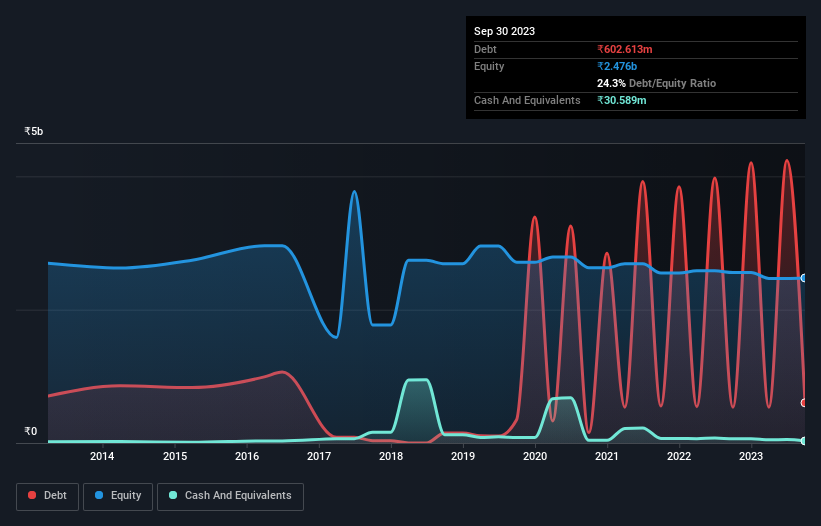
David Iben put it well when he said, 'Volatility is not a risk we care about. What we care about is avoiding the permanent loss of capital.' So it might be obvious that you need to consider debt, when you think about how risky any given stock is, because too much debt can sink a company. Importantly, V2 Retail Limited (NSE:V2RETAIL) does carry debt. But the real question is whether this debt is making the company risky.
Why Does Debt Bring Risk?
Debt and other liabilities become risky for a business when it cannot easily fulfill those obligations, either with free cash flow or by raising capital at an attractive price. Part and parcel of capitalism is the process of 'creative destruction' where failed businesses are mercilessly liquidated by their bankers. However, a more usual (but still expensive) situation is where a company must dilute shareholders at a cheap share price simply to get debt under control. Having said that, the most common situation is where a company manages its debt reasonably well - and to its own advantage. The first thing to do when considering how much debt a business uses is to look at its cash and debt together.
See our latest analysis for V2 Retail
How Much Debt Does V2 Retail Carry?
You can click the graphic below for the historical numbers, but it shows that as of September 2023 V2 Retail had ₹602.6m of debt, an increase on ₹536.9m, over one year. However, it also had ₹30.6m in cash, and so its net debt is ₹572.0m.

How Strong Is V2 Retail's Balance Sheet?
The latest balance sheet data shows that V2 Retail had liabilities of ₹2.91b due within a year, and liabilities of ₹3.60b falling due after that. Offsetting this, it had ₹30.6m in cash and ₹384.0k in receivables that were due within 12 months. So its liabilities total ₹6.48b more than the combination of its cash and short-term receivables.
While this might seem like a lot, it is not so bad since V2 Retail has a market capitalization of ₹12.2b, and so it could probably strengthen its balance sheet by raising capital if it needed to. But we definitely want to keep our eyes open to indications that its debt is bringing too much risk.
We measure a company's debt load relative to its earnings power by looking at its net debt divided by its earnings before interest, tax, depreciation, and amortization (EBITDA) and by calculating how easily its earnings before interest and tax (EBIT) cover its interest expense (interest cover). This way, we consider both the absolute quantum of the debt, as well as the interest rates paid on it.
Given net debt is only 0.97 times EBITDA, it is initially surprising to see that V2 Retail's EBIT has low interest coverage of 0.88 times. So while we're not necessarily alarmed we think that its debt is far from trivial. Pleasingly, V2 Retail is growing its EBIT faster than former Australian PM Bob Hawke downs a yard glass, boasting a 111% gain in the last twelve months. When analysing debt levels, the balance sheet is the obvious place to start. But you can't view debt in total isolation; since V2 Retail will need earnings to service that debt. So if you're keen to discover more about its earnings, it might be worth checking out this graph of its long term earnings trend.
Finally, while the tax-man may adore accounting profits, lenders only accept cold hard cash. So the logical step is to look at the proportion of that EBIT that is matched by actual free cash flow. Happily for any shareholders, V2 Retail actually produced more free cash flow than EBIT over the last three years. That sort of strong cash generation warms our hearts like a puppy in a bumblebee suit.
Our View
Happily, V2 Retail's impressive conversion of EBIT to free cash flow implies it has the upper hand on its debt. But the stark truth is that we are concerned by its interest cover. Looking at all the aforementioned factors together, it strikes us that V2 Retail can handle its debt fairly comfortably. On the plus side, this leverage can boost shareholder returns, but the potential downside is more risk of loss, so it's worth monitoring the balance sheet. The balance sheet is clearly the area to focus on when you are analysing debt. But ultimately, every company can contain risks that exist outside of the balance sheet. Case in point: We've spotted 2 warning signs for V2 Retail you should be aware of, and 1 of them is a bit concerning.
If, after all that, you're more interested in a fast growing company with a rock-solid balance sheet, then check out our list of net cash growth stocks without delay.
New: Manage All Your Stock Portfolios in One Place
We've created the ultimate portfolio companion for stock investors, and it's free.
• Connect an unlimited number of Portfolios and see your total in one currency
• Be alerted to new Warning Signs or Risks via email or mobile
• Track the Fair Value of your stocks
Have feedback on this article? Concerned about the content? Get in touch with us directly. Alternatively, email editorial-team (at) simplywallst.com.
This article by Simply Wall St is general in nature. We provide commentary based on historical data and analyst forecasts only using an unbiased methodology and our articles are not intended to be financial advice. It does not constitute a recommendation to buy or sell any stock, and does not take account of your objectives, or your financial situation. We aim to bring you long-term focused analysis driven by fundamental data. Note that our analysis may not factor in the latest price-sensitive company announcements or qualitative material. Simply Wall St has no position in any stocks mentioned.
About NSEI:V2RETAIL
V2 Retail
Together with its subsidiary, V2 Smart Manufacturing Private Limited, engages in the retail trade of apparel and garments, textiles, and accessories in India.
Solid track record with moderate growth potential.
Similar Companies
Market Insights
Community Narratives



